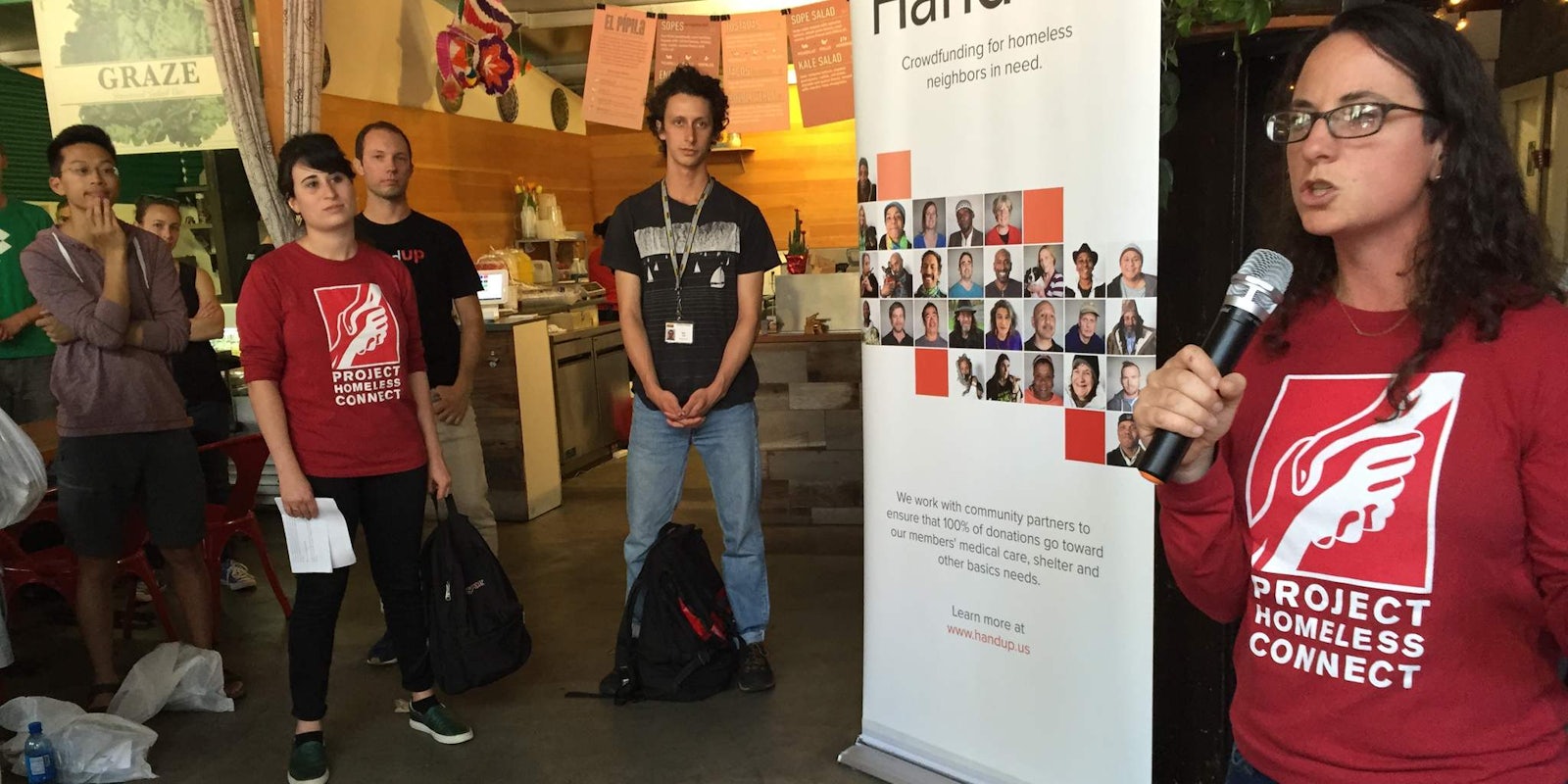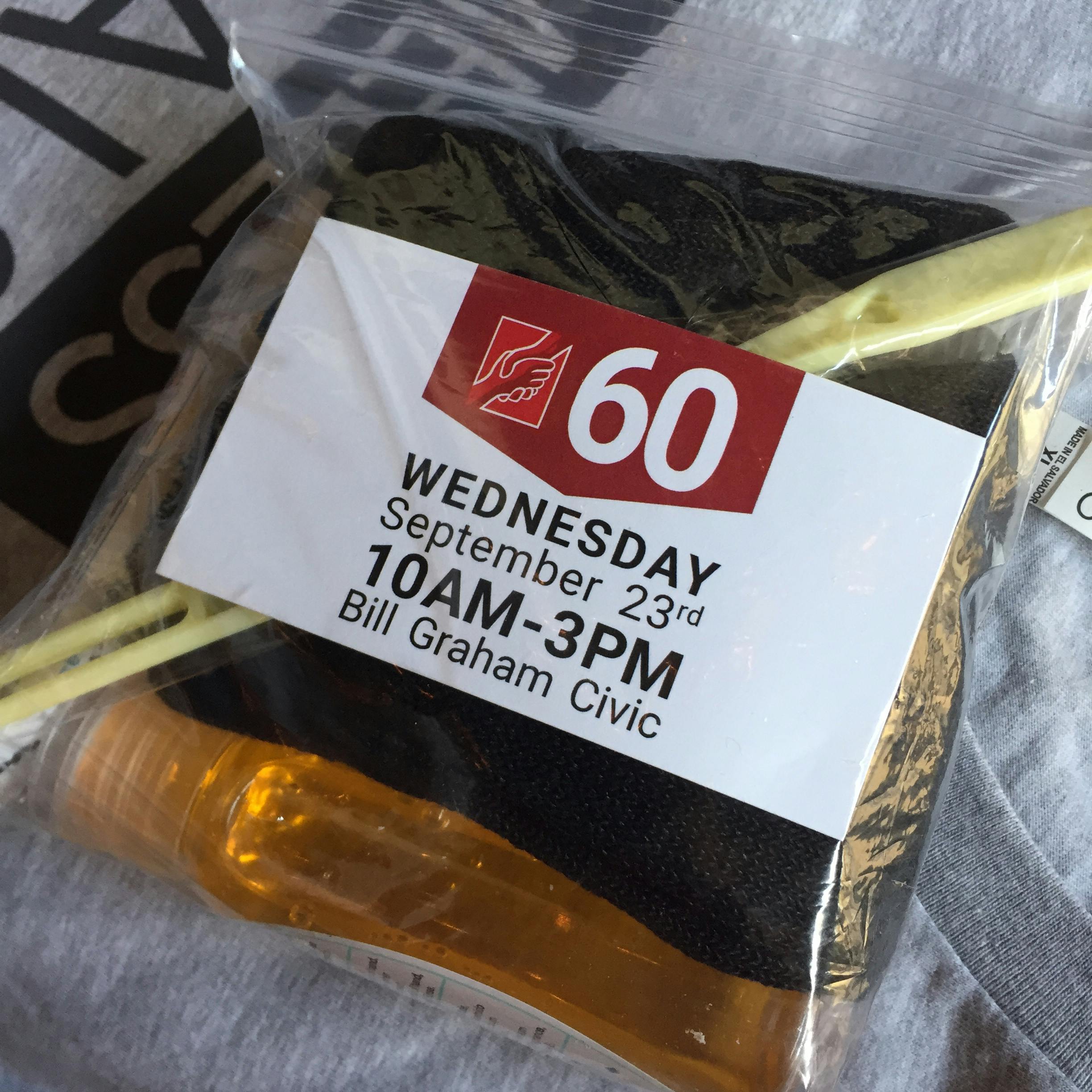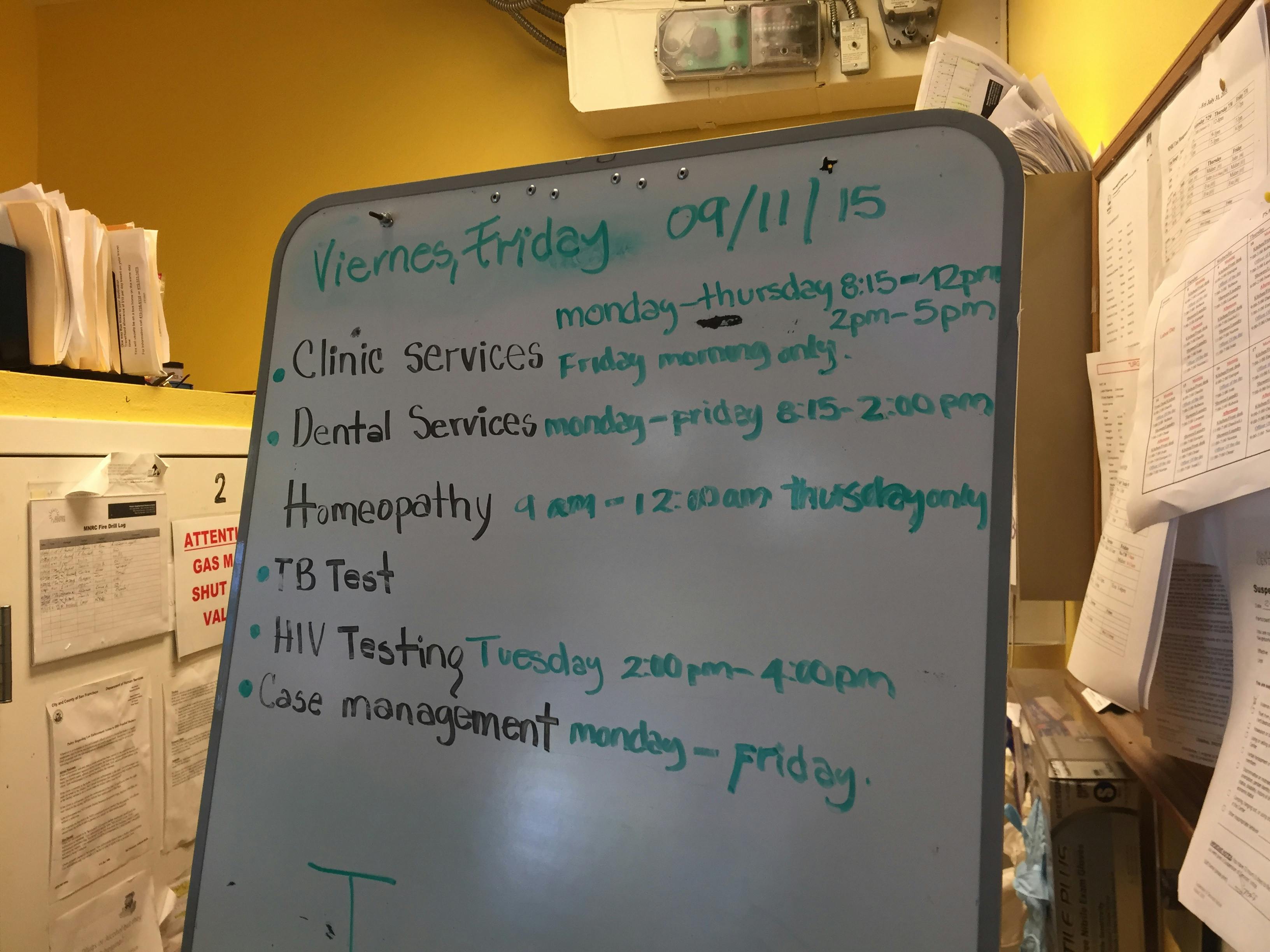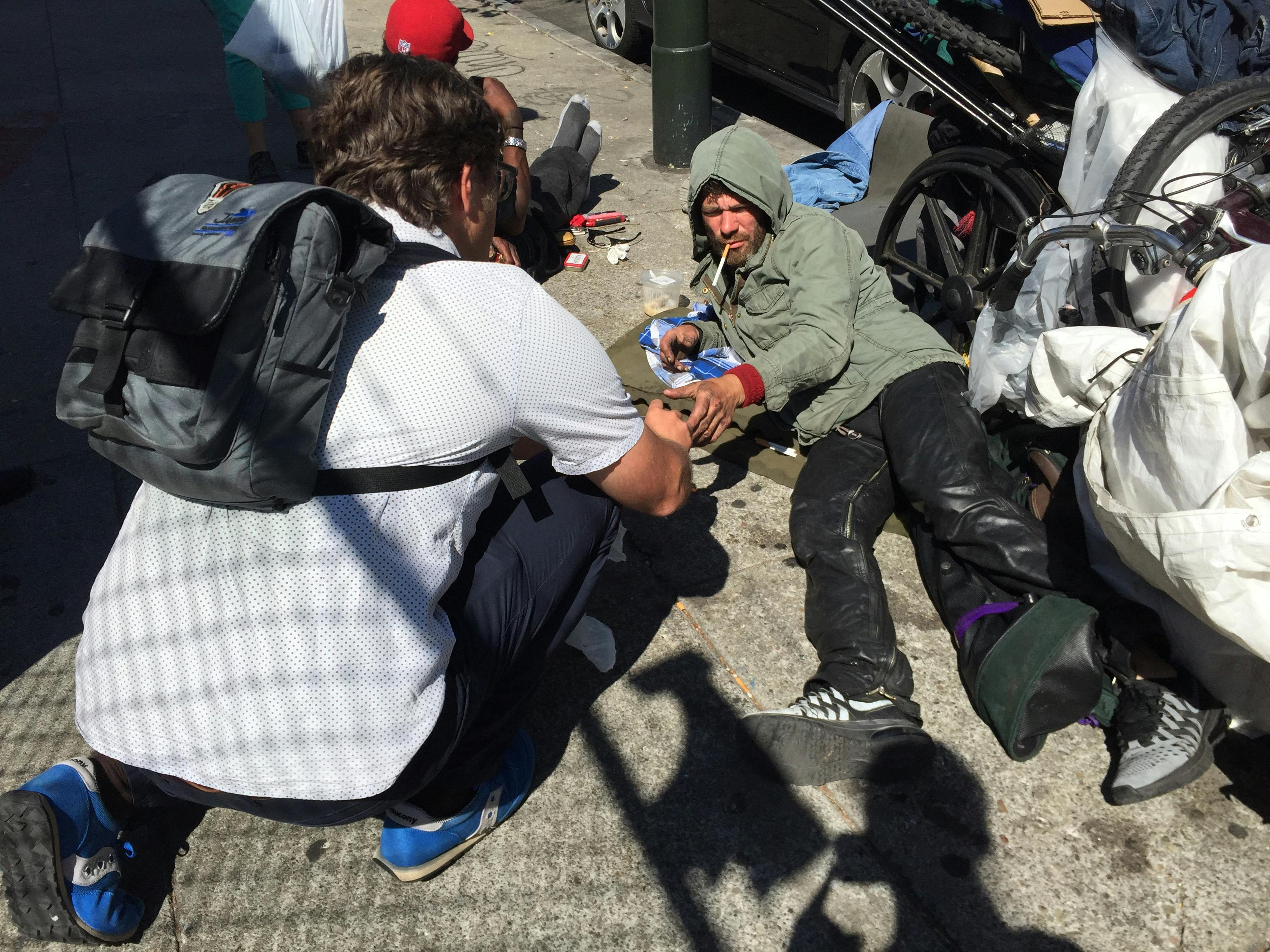Quiet tears slipped down her cheeks and fell on the threadbare blue sweatshirt she was wearing. A hand caked with dirt brushed one away, and she sat cross-legged, with one foot down in the gutter underneath a blue tarp tent. Her daughter talked to her for the first time in five years, she said, and she wanted to buy a bus ticket to visit her. She reached out and took my hand when she told me how much she wanted to change.
Beth is one of San Francisco’s homeless residents. She’s a former in-home care nurse and has lived on the streets for years. But thanks to the kindness of strangers (including her regular donor, Frank) and San Francisco-based startup HandUp, she can buy a ticket to visit her daughter, and even a trinket and picnic lunch to give her when she arrives.
If you walk through the streets of San Francisco, you’d be hard-pressed not to see someone in need. Homelessness is a visible issue in the city, home to millionaire college dropouts and startup founders creating photography and delivery apps, where venture capital flows to “unicorn” companies worth billions. The last official count that took place earlier this year found 6,686 people were “visibly homeless” in San Francisco, meaning they lived on the streets. That number doesn’t include those individuals living in cars or couch surfing.
HandUp, a local startup that connects donors to homeless people via crowdfunding, wants to provide resources for people to better understand how they can empower people out of homelessness. About 60 volunteers congregated at The Hall on Market Street in downtown San Francisco on Friday for HandUp’s first outreach day, to spend the afternoon handing out hygiene bags and informational support to homeless neighbors in need. The event coincided with the company’s new gift card program, launched at the end of August.
People can now purchase gift cards through HandUp to hand out to homeless people instead of cash. They can be redeemed at Project Homeless Connect, HandUp’s biggest partner, for things like dental services, socks, soap, bus tickets, phone bills, or a number of other needs. Project Homeless Connect works with civic and nonprofit organizations to provide crucial services for homeless and at-risk individuals, including housing and job information, and services like massages and hair cuts.
The event wasn’t just about giving homeless folks bags of soap, however. HandUp wanted people to really engage with the homeless neighbors on the street because that’s sometimes more important than getting pocket change.
“A lot of our members tell us it’s not the donations, but the words of support,” Rose Broome, the co-founder of HandUp, said at the event.
Friday’s event was just as much about educating San Francisco residents on the issues affecting homeless people as it was about providing them gift cards and more information about Project Homeless Connect. Tech companies including Dropbox, Google, and Zendesk provided monetary donations as well as volunteers to participate. Google is one of HandUp’s main corporate donor partners.
I joined the group of volunteers who visited the Mission District. We worked with Community Ambassadors out of the Mission Neighborhood Resource Center, where homeless and at-risk individuals go for healthcare, showers, and assistance getting back on their feet.
Community Ambassadors walk around the neighborhood, talk with homeless people and sometimes escort them to the center, assist overdose victims, and even provide directions for out of town tourists who are exploring the city. The program is designed to help ease tension in the community that exists either through language or cultural differences. The program was permanently implemented in San Francisco in 2011, and volunteers work in three different neighborhoods.
Olga Romero is a Community Ambassador for the Mission District. She and her four children used to be homeless, and lived in a car. Now she’s a familiar presence in the Mission District. As we wandered the streets talking to the homeless and providing hygiene products and gift cards, people gave her hugs and said hello.
“I was part of the homeless community before,” Romero said. “I was living in the streets with my kids. I almost had CPS take me away from my kids, so I know exactly how they feel being homeless. You need to be in the shoes of the people of the street to know how they feel.”
Romero says that the new Navigation Center, a pilot location that houses and counsels homeless people nearby, has been a great partner with the center.
Most of the people we talked to were familiar with Project Homeless Connect, including PHC 60, a big event on Sept. 23 at the Bill Graham Civic Auditorium that provides a one-stop shop for people looking for services like dental care, DMV photos, lunch, housing information, and many other services.
While most homeless folks took our hygiene kits right away, explaining the HandUp gift cards was a little more complicated. Because they can only be redeemed at Project Homeless Connect and aren’t your typical Visa cards, some people were skeptical upon receiving one, and not entirely sure how to use it. According to HandUp’s Katrina Belda, people redeemed between 50 and 60 percent of the gift cards since they launched more than two weeks ago.
The homeless population in San Francisco is aging, and continues to grow. The city hasn’t solved the problem yet, though there are a number of politically controversial ideas to solve it, including creating more housing like the Navigation Center, and programs that are similar to New York’s “right to shelter” rules that give anyone who asks a place to stay.
Lawrence Grodeska, founder of CivicMakers and a Mission resident, volunteered in my group at Friday’s event. He said that while it was tricky to figure out who needed the gift cards and the most assistance, it was ultimately a positive learning experience, especially to connect with the people he sees in his community on a regular basis.
“I really applaud what HandUp is doing, which is the dirty work of social change,” he said. “Getting out on the streets and trying to see how we can integrate technology and technological systems with the human systems that we have, which not a lot of people in the tech world are willing to do. Knowing your community and knowing who your audience is and really going out to meet them face to face is just a really important part of designing any type of social programs.”
HandUp is just one of the many businesses and organizations trying to help solve rampant homelessness in San Francisco. Its mission to provide donations through technology with the support of some of the biggest tech companies in Silicon Valley might be different than other organizations, but the idea is the same—help get people off the streets.
Homelessness won’t be solved overnight, but events like HandUp’s outreach day and Project Homeless Connect’s regular outreach walks can give San Francisco residents a new perspective on the people they pass by each day.
On Friday, Beth found out she had donations waiting for her at Project Homeless Connect. She smiled from her tent in the street, relieved to learn people donated enough money through HandUp to purchase a bus ticket to visit her daughter. She wanted to make sure to purchase a roundtrip ticket, because she didn’t want to presume she could go home just yet.
Photo by Selena Larson





